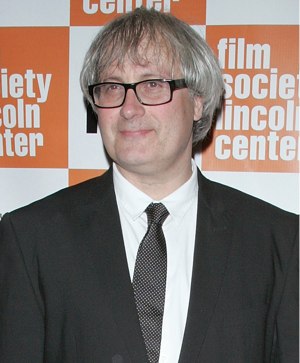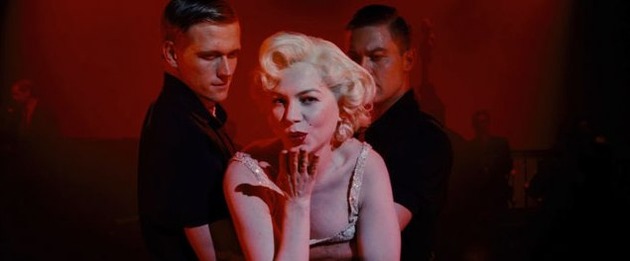'Beyond Thrilled': My Week With Marilyn Director Simon Curtis On His Auspicious NYFF Debut
 The world premiere of your first feature film -- in the hypercritical climes of the New York Film Festival, no less -- would be nerve-wracking for any director. But Simon Curtis isn't any director. He's a BAFTA- and Emmy-nominated television and stage veteran who's worked with a who's who of British acting royalty, a noteworthy group of whom appear in Curtis's feature debut My Week With Marilyn.
The world premiere of your first feature film -- in the hypercritical climes of the New York Film Festival, no less -- would be nerve-wracking for any director. But Simon Curtis isn't any director. He's a BAFTA- and Emmy-nominated television and stage veteran who's worked with a who's who of British acting royalty, a noteworthy group of whom appear in Curtis's feature debut My Week With Marilyn.
Of course, Kenneth Branagh, Judi Dench and Derek Jacobi (along with younger stars Eddie Redmayne and Dominic Cooper) all orbit the staggering lead performance of Michelle Williams as Marilyn Monroe during the troubled making of The Prince and the Showgirl. Movieline caught up with Curtis today to take the temperature of both his My Week With Marilyn experience and his NYFF afterglow.
How are you feeling now having your big, buzzy, New York Film Festival world premiere out of the way?
I was beyond thrilled with the response in the room -- all three screenings yesterday. We'll see how we get on. But I'm very proud of the film; it feels like a crowd-pleaser. That's my dream. It's full of very complicated, sort of upsetting things, but it's very, very funny, too. Or I always thought so, and it seems the audience did, too. So I was thrilled to hear that big New York audience -- that big cinema -- laughing.
I was really surprised to hear you say yesterday that this was your first film. I know some of your background -- the stage and TV, of course, but I would have sworn you'd made a feature previously.
Yeah. But there's "TV," and there's TV, and I've been very lucky. Some of those BBC things... I don't know if you saw Cranford, for example. In terms of the cast, I don't know where the difference is. Frankly, there's more TV than good films at the moment. [Laughs] But anyway. Yeah, this is my first film.
Why did you want to do this as your big-screen debut?
I fell in love with the material. I feel in love with the two diaries. Along the way, as we've been developing this, I've spoken to people about other movies, and they nearly happened and all that. But I decided to hold on for the film that I truly believed in -- the film that I cherished. I've only thought about this in recent conversations, but it has so many of the themes in this film that are the themes I live my life by. I'm married to an American actress [Elizabeth McGovern] who's come to live in England. Americans can be Anglophiles; I don't know what the word is for an English person who loves America, but I've always loved America. The idea of celebrity when it starts to go away, as expressed by Olivier and Vivian [Leigh] in this film. These are the themes I obsess over that happen to be in this film. I didn't choose it for that reason, but in retrospect, that's why I was drawn to it, perhaps. And also, as a young man wanting to get into the profession, I identify very much with Colin's voyage into the film.
Considering that there were two books, and considering the richness of the material and the characterizations, did it ever occur to you to maybe adapt this as a miniseries or longer movie for TV?
No. I always wanted to make this as a film. One of the things that makes this film work is a bona fide movie star playing Marilyn. Michelle is a genius, I think, but not only is she a genius, she's at the exact right moment of her life to play Marilyn, age 30, in 1956. It's what I dreamt of: the right person to do it, you know?
Well, yes, and I'd agree that Michelle is something of a genius. But do you really think she's a "bona fide movie star"? Wouldn't that work against playing another, actual bona fide movie star?
You know more about that than me, but for me, she is. Basically, instead of saying "bona fide movie star," we can just say she is absolutely the right person to play this character now. She's the right age; there's so much excitement and interest in her. Also, she's a director's dream. She's such a hard worker, and she sets such high standards for herself. But she also, fantastically for this very complicated character -- let alone the risk of playing someone so famous -- she works equally hard on the internal character as she does on the external. And of course part of the film is the culture clash between the external, Olivier style of acting, and the internal, Method style. But Michelle does both. Working her way toward the start of the shoot, she was working equally on the body language. That dance that Marilyn does in The Prince and the Showgirl was a way into learning how Marilyn moved -- not just in that dance, but in life as well. But then she'd be working on all the internal stuff. And it's a very particular moment in Marilyn's life.
We always said it wasn't a biopic; it was a moment in time. And at this time, when she arrives in England, she is now married to the great intellectual who she thought would rescue her from her life and give her intellectual and artistic credibility. She was coming to work with the great Olivier -- who, again, she thought would give her credibility. And also, she was way ahead of her time with Milton Greene in setting up Marilyn Monroe Productions to produce her own movies. When she arrived in England, it was like this phenomenal moment that could all have gone a different way. And in some ways, the story of our film -- the making of The Prince and the Showgirl -- is how all those dreams collapsed.
When you have such concrete primary sources as the diaries and The Prince and the Showgirl -- and you clearly want to treat each with a certain verisimilitude -- how did you go about making sure that My Week With Marilyn is its own thing? Is it just naturally so?
Winding back, I was very keen to recreate The Prince and the Showgirl as accurately as possible. But Michelle and I talked about it a lot -- about how there's The Prince and the Showgirl, and there's also the press conferences and little snippets of Marilyn, but there's no footage, obviously, of her in private. So that was a world we could make our own. You know what I mean? The casting in any film makes a difference, but in this in particular, there's something about Branagh's Olivier that is unique to our film. Whereas another Olivier would have been a different kettle of fish. Another Colin Clark would have been a different thing. Eddie has a particular flavor, doesn't he? Several attributes -- he the authentic old Etonian playing an old Etonian. It's that sort of thing.
You're also directing Branagh directing his own character and Marilyn on a film set within your set. How do you keep control as these layers compound?
It's very complicated, some of those scenes. I found it very hard working out where Marilyn would do five or even six takes of a line. But the thing about directing is that it's this bizarre mixture of control and lack of control, and I'm a great believer in the idea that if you cast the right people, they'll bring something special. In totally different ways, Michelle and Ken brought so much into the room. They're both such formidable intellects; they know what they know. I know some directors would be quite challenged by that, but I was just very grateful.
To say nothing of the supporting cast -- Judi Dench, Derek Jacobi...
I've always believed in being ambitious with casting, because actors can only say no. Never be afraid of asking. A lot of those parts are actually quite short commitments, so we sort of got lucky in a way. Judi had met Sybil Thorndike, and obviously it intrigued her -- the notion of playing Sybil. I'd also worked with Judi in two previous years, so that helped, too. The allure of working with Michelle helped a lot, and liking the script helped. Being in London -- local -- helped. All these things contribute.
Julia Ormond surprised me here, too -- just totally heartbreaking.
Like a lot of actresses her age, she understands Vivian's heartbreak about having been the most beautiful woman in the world and now, at only 43, being made to feel like she's passed it. I think modern actresses completely get that.
I was wincing.
Yeah! Absolutely. But it was very important to keep that in, because had Marilyn lived, maybe at 43, she'd have felt the same. Even when you're the most beautiful woman of your generation, it can go.
Do you think we can even have mythologies worthy of these kinds of interpretations and dramatizations in the future? I mean, there's Twitter, Facebook, blogs, the rest of the Internet. Is that, too, a time that's passed?
Well, I do think the film is a love letter to a lost time. And I also think that Marilyn was a sort of prototype celebrity in a way -- that frenzy around her, that interest in here. I read a biography written shortly after [The Prince and the Showgirl] -- while she was still alive -- that there was a sort of People magazine-y type of thing. So obviously that was going on. It just wasn't in everybody's face all the time.
I love your having invoked Lost in Translation as something of an inspiration for this. What's behind that influence?
It wasn't an influence, but I was thinking, "Can this story work?" And watching one of my favorite film, Lost in Translation, made me think, "Yes, it can." They're these two different people who come into contact with each other randomly for this short, intense time, have this impact on each other, and then go their separate ways. That's in the structure of this film.
What's next for you?
I'm not sure. I'd love to do a contemporary American story -- without iconic characters. [Laughs] But I don't know.
I was talking to Sam Shepard last week about his collaborations with European filmmakers, and their historical interest in American mythology, landscape and psyche. Do you relate to that?
That's interesting. Yes, I think I do. I mean, for a Brit, I'm very knowledgeable about America and, again, whatever the equivalent of an American Anglophile is for America. I'm married to an American. I spend a lot of time here; my children are American citizens. It's very precious to me, my relationship with America. You can think also of Sam Mendes, American Beauty, that sort of thing. But I do recognize that, and it has a great appeal to me.

